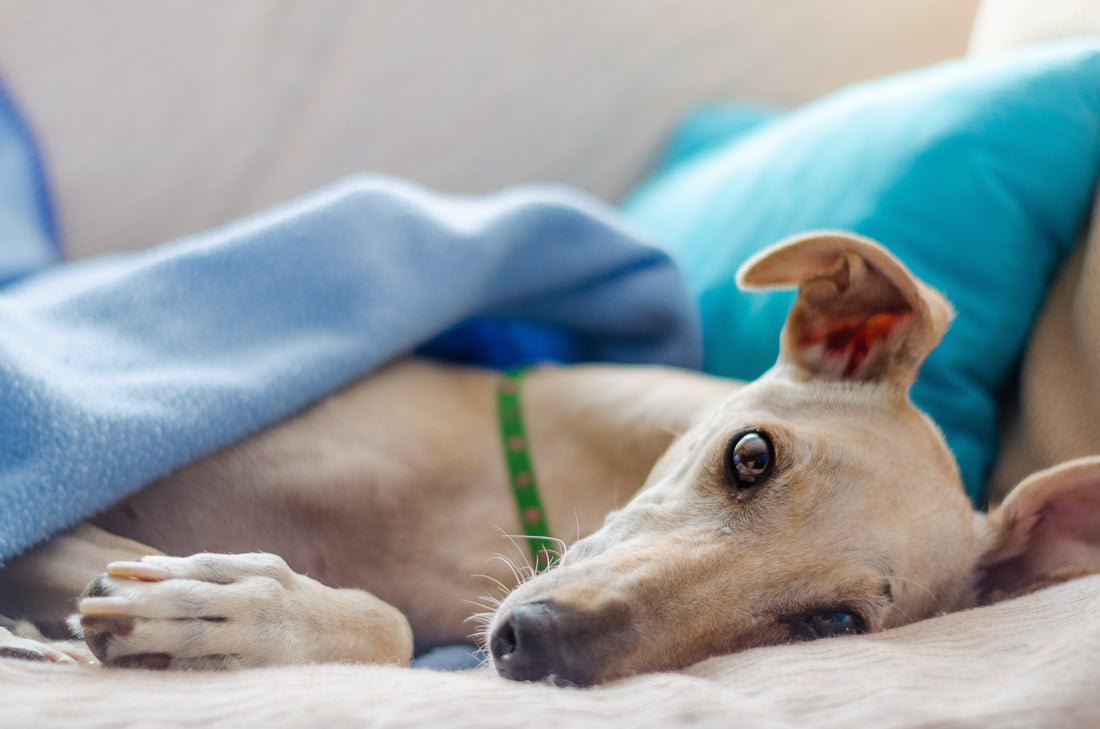Do you have a greyhound? If so, then you already know what wonderful and loving companions they are, and what amazing family dogs they make, but do you also know they can be more susceptible to digestive and gastrointestinal issues than other breeds?
Top Causes of Tummy Problems in Greyhounds
Bloat
Medically referred to as Gastric Torsion or gastric dilatation-volvulus (GDV), is a very serious condition that if not treated immediately will quickly lead to death.
Affecting primarily large dogs with deep narrow chests, this life-threatening disorder occurs when a dog’s stomach fills with air, gas, fluid, or food, causing the abdomen to expand and put pressure on the internal organs. Bloat can also cause the stomach to twist or flip, and cut off blood flow to the heart, causing a dog to go into shock.
Symptoms of Bloat
- Swollen, stomach that feels hard and may elicit pain when touched.
- Signs of anxiety, such as pacing and restlessness.
- Signs of distress, including panting.
- Drooling, retching, and attempting to vomit.
Remember, bloat is a medical emergency that if not treated immediately is almost always fatal, so if you observe any of the symptoms above, it is vital that you get your dog to a veterinarian as quickly as possible.

Preventing Bloat
Although there is much we do not understand about this condition, there are some precautions you can take to prevent it from happening to your dog.
- Feed your dog 2-3 meals a day instead of one large meal.
- If your dog eats fast, use a slow feeder to prevent gulping their food down.
- Never exercise your dog or allow them to run for several hours after a meal.
- Eliminate stress in your dog’s environment. Although experts are unsure of why, stress has been shown to cause bloat.
Stress
Stress can quickly lead to digestive upset in your greyhound. Greyhounds are very sensitive dogs, an endearing trait reflected in their calm and gentle personalities. They also thrive on consistency, making even small changes to their daily routine potentially stress inducing.
Sensitive Stomach
Greyhounds have “sensitive stomachs”, making them prone to digestive upset. Monitor your dog when outside to make sure they do not ingest foreign objects, and always take time when transitioning them to a new food by introducing it slowly.
Hemorrhagic Gastroenteritis (HGE)
Although the cause is unclear, HGE is a condition that Greyhounds tend to be prone to. This disorder causes diarrhea and vomiting that comes on suddenly and can quickly put them at risk for dehydration.

Food Intolerance and Allergies
Digestive upset due to diet is common in many breeds, and Greyhounds are no exception. If you suspect your dog suffers from food sensitivities, have your veterinarian test them for allergies. Once the ingredients causing the issues are identified, you can adjust their diet accordingly.
Inflammatory Bowel Disease (IBD)
IBD is a condition that can affect Greyhounds, causing chronic diarrhea and vomiting due to inflammation in the digestive tract. If not properly managed, IBD can quickly lead to unintended weight loss and malnutrition.
Diet
Because Greyhounds are known to have difficulty digesting certain foods, including those that are high in fat and/or fiber, it’s important to consult your vet for guidance in determining an appropriate diet that will not cause digestive upset.
Natural Supplements for Digestive Upset in Greyhounds
Getting your dog feeling better fast starts with feeding a bland diet for 2-3 days until normal digestion is restored. Be prepared with an easy to use, freeze-dried instant meal!
If acute diarrhea is present, treating with an anti-diarrheal is suggested.

If your dog is suffering from occasional, but more chronic diarrhea and/or soft stools, a fast-acting probiotic to restore gut balance is recommended, along with a daily probiotic to maintain gut health.
Products related to this article:
Every Sale Supports a Shelter Pet. Learn More.
Made in Vermont. Learn More.
If you suspect your pet is sick, call your vet immediately. For health-related questions, always consult your veterinarian, as they have examined your pet, know the pet's health history, and can make the best recommendations for your pet.




